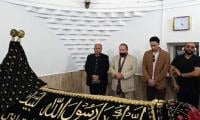The killing of jihadism expert Hisham-al-Hashemi has stirred fears Iraq is entering a dark and violent phase, as boiling tensions between pro-Iran factions and the government reach new heights.
Hashemi, 47, was gunned down outside his home in east Baghdad late on Monday by masked assailants on motorcycles. While the perpetrators remain on the run, experts say the death signals a dramatic turn for political violence brewing since mass protests erupted in October.
"Armed forces of various affiliations have killed protesters and others willing to publicly criticise the government and armed forces with impunity," said Belkis Wille of Human Rights Watch.
"But killing someone of his stature smacks of a country where some groups have become so emboldened by the complete impunity for serious abuses, that they can kill anyone they want to without paying a price," she said.
Over the course of years, Hashemi had developed a vast network encompassing top decision makers, former jihadists and rival political parties, often mediating among them. His exceptional access had granted him a level of protection, those close to him said, but the balance started to tip in October.
His support for popular protests against a government seen as too close to Iran infuriated Tehran-backed factions in Iraq’s Hashed al-Shaabi military network. Hashemi skirted threats to mediate between protesters and senior government officials, even as activists were fatally shot outside their homes and dozens more abducted.
"The parameters changed starting in October. There was a new modus operandi, and a shift in the confrontation with pro-Iran factions," said Adel Bakawan, an Iraqi expert who knew Hashemi.
Other experts say the real turning point was in January, when a US strike on Baghdad killed Iranian General Qasem Soleimani and Hashed deputy head Abu Mahdi al-Muhandis. Factions within the Hashed, particularly those close to Iran like Kataeb Hizbullah, vowed revenge against both the US and its allies inside Iraq, whatever the cost.
As someone with close ties to foreign governments, Hashemi was seen as a potential target, and he left Baghdad for a few days in late January, he told AFP at the time. "Hisham was aware that things had shifted," said Renad Mansour, a researcher at London-based Chatham House who worked with Hashemi for years.
"The killing of Abu Mahdi unleashed all of these groups that he had been trying to control and centralise. We’re still feeling the shock waves," he said. The Hashed published a statement mourning Hashemi, but hardline groups within the network did not address the killing.
"We demand security forces follow up on this crime and catch the terrorist group that assassinated Hashemi," the Hashed said. Within the network, Kataeb Hizbullah has accused then-spy chief Mustafa al-Kadhemi of complicity in the deadly strike and deeply opposed his rise to Iraq’s premiership in May. Hashemi had advised Kadhemi for years, a relationship that put the expert in "danger" when the former intelligence head became premier, those close to him said.
Liberal Justice Elena Kagan on Sept. 13, 2016. — Slate website WASHINGTON: U.S. Supreme Court justices, wading back...
A representational image of inmates behind jail bars. — Unsplash/FileMOSCOW: A Russian court on Wednesday ordered...
Sudanese soldiers guard the surrounding area of the UNMIS compound in El-Fasher, the administrative capital of North...
US quietly shipped ATACMS missiles to Ukraine. — Report news agencyWASHINGTON: The United States in recent weeks...
US President Joe Biden during his address in California. — AFP FileWASHINGTON: President Joe Biden signed a...
The World Meteorological Organisation flag. — AFP FileGENEVA: Global temperatures hit record highs last year, and...







